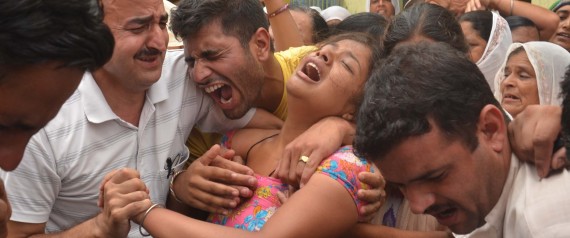prasad1
Active member

When it was obvious that Narendra Modi would become India's prime minister, Pakistan grew alarmed. Modi's party, the Bharatiya Janata Party, is the party that gave India its nuclear status. Indians voted for Modi and the brave India he promised in hopes that his government would not indulge Pakistani predations, and punish them instead. Pakistan has developed one core strategy in dealing with India over the decades: deploy Islamist militants to attack India while seeking cover from retaliation under its nuclear weapons. It should be noted that while Pakistan is most notorious for supporting Islamist terrorists, it also supports religious and ethnic insurgencies within India as well. Pakistan not only seeks to use terrorism to illegitimately acquire territory in Indian Kashmir, it also wants to resist India's rise in the international system. Until the Modi administration, Pakistan has remained fairly confident that India will not respond militarily to punish Pakistan for its state-sponsored terrorism or to deter it from doing so in the future.
Modi's election prompted Pakistan to wonder how India will respond to a bold Pakistan-backed terrorist attack. Would it follow the path of the previous prime minister, Manmohan Singh, and defuse public demands for revenge in effort to avoiding any skirmish with Pakistan that would impede India's economic growth? Or would it embrace a more hawkish approach that would punish Pakistan?
..............................
The attack on Gurdaspur is an important escalation by Pakistan. It is the first attack during the Modi government's tenure that has taken place outside of Jammu and Kashmir, the territory that Pakistan seeks to wrest from India. Yet Gurdaspur, a middling third-tier city that will not capture the attention of India's public for long, does not have the provocation power of, say, an attack on Delhi or Mumbai. It is unlikely, in the minds of Pakistanis, that India would risk war for Gurdaspur. However, it is almost certain that a tepid response to the Gurdaspur attack will most likely invite more ambitious attacks on high-value targets within India.
.....................................
If India fails to respond, it will no doubt court further Pakistani adventurism. After the bust-up in Myanmar, a failure to take decisive action to punish Pakistan will mean that Pakistan has essentially called India's bluff.
India has options that include political, diplomatic, economic and military modes of redress. Diplomatically, it can downgrade Pakistan's mission or even oust Pakistan's ambassador. India can engage in economic sabotage. Military options that are proportionate include air raids on terror camps in Pakistan-administered Kashmir from aircraft safely within Indian airspace. These are all options at the lower end of the spectrum.
Politically, India must change the narrative about this conflict with its major partners. India would be behooved to tell its international backers bluntly that there is no "India-Pakistan problem" -- only a Pakistan problem. India's partners should support India in its application of power and join hands to force Pakistan to abandon terror under a nuclear umbrella as tools of foreign policy rather than, as is the case, finding ways of excusing Pakistan's behavior in order to continue writing checks to Islamabad.
Pakistan is not just India's problem. It's time the international community understood this and began acting accordingly.
http://www.huffingtonpost.com/c-chr...spur_b_7926308.html?ncid=txtlnkusaolp00000592

